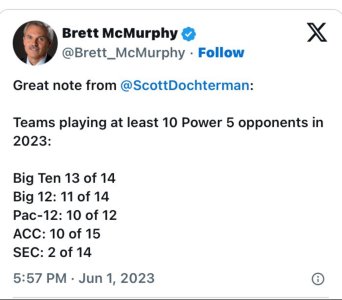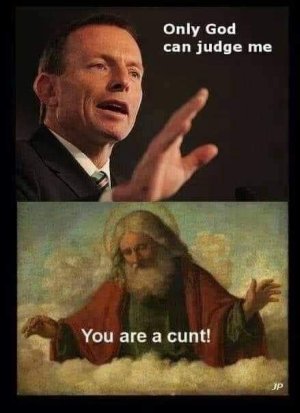-
In Memory of Rebarcock.
As we navigate life without Pat 'Rebarcock.' Flood, who passed on Sept 21, 2025, we continue to remember the profound impact he had on our community. His support was a cornerstone for our forum. We encourage you to visit the memorial thread to share your memories and condolences. In honor of Pat’s love for storytelling, please contribute to his ‘Rebarcock tells a story’ thread. Your stories will help keep his spirit alive among us.
You are using an out of date browser. It may not display this or other websites correctly.
You should upgrade or use an alternative browser.
You should upgrade or use an alternative browser.
Master Thread Dance Your Cares Away/Fraggle/Law Abiding Citizens
- Thread starter Bryan74b
- Start date
Master Threads

Why men should give their wives a cheat pass this Christmas – according to an expert
Wednesday Martin, an American writer, on why everything we believe about infidelity is wrong
The article was written 5 years ago
Fact checking & common sense isn’t his forte.
Why men should give their wives a cheat pass this Christmas – according to an expert
Wednesday Martin, an American writer, on why everything we believe about infidelity is wrongwww.telegraph.co.uk
The article was written 5 years ago
Mine has been off and on bad for months. The provider was changing out the equipment to increase speeds to about 1 Gbps for the past 3 months and service has been bad the whole time. Now they are fine tuning the stuff meaning intermittent outagesSo it was you that fucked it up for the rest of us. Lol. Edward from Kentucky said someone cut the fiber optic lines.
Looks as if people really took it to heart..!
Why men should give their wives a cheat pass this Christmas – according to an expert
Wednesday Martin, an American writer, on why everything we believe about infidelity is wrongwww.telegraph.co.uk
The article was written 5 years ago
Just look at the "Sex in the Senate" escapades AND society in general!
Why the fuck did they add bird noises to the Video almost making it unwatchable
Trump would install loyalists to reshape U.S. foreign policy. Diplomats gird for "doomsday"
Gram Slattery, Simon Lewis, Idrees Ali, Phil StewartUpdated Mon, December 18, 2023 at 1:46 PM CST·8 min read
12.8k
Republican presidential candidate and former U.S. President Trump campaigns in Reno
(Changes headline)
By Gram Slattery, Simon Lewis, Idrees Ali, Phil Stewart
WASHINGTON (Reuters) -Donald Trump in a second term would likely install loyalists in key positions in the Pentagon, State Department and CIA whose primary allegiance would be to him, allowing him more freedom than in his first presidency to enact isolationist policies and whims, nearly 20 current and former aides and diplomats said.
The result would enable Trump to make sweeping changes to the U.S. stance on issues ranging from the Ukraine war to trade with China, as well as to the federal institutions that implement - and sometimes constrain - foreign policy, the aides and diplomats said.
During his 2017-2021 term, Trump struggled to impose his sometimes impulsive and erratic vision on the U.S. national security establishment.
He often voiced frustration at top officials who slow-walked, shelved, or talked him out of some of his schemes. Former Defense Secretary Mark Esper said in his memoir that he twice raised objections to Trump's suggestion of missile strikes on drug cartels in Mexico, the U.S.'s biggest trade partner. The former president has not commented.
"President Trump came to realize that personnel is policy," said Robert O'Brien, Trump's fourth and final national security adviser. "At the outset of his administration, there were a lot of people that were interested in implementing their own policies, not the president's policies."
Having more loyalists in place would allow Trump to advance his foreign policy priorities faster and more efficiently than he was able to when previously in office, the current and former aides said.
Among his proposals on the campaign trail this year, Trump has said he would deploy U.S. Special Forces against the Mexican cartels - something unlikely to get the blessing of the Mexican government.
If he returns to power again, Trump would waste little time cutting defense aid to Europe and further shrinking economic ties with China, the aides said.
O'Brien, who remains one of Trump's top foreign policy advisers and speaks to him regularly, said imposing trade tariffs on NATO countries if they did not meet their commitments to spend at least 2% of their gross domestic product on defense would likely be among the policies on the table during a second Trump term.
The Trump campaign declined to comment for this article.
Unlike in the lead-up to his 2016 election, Trump has cultivated a stable of people with whom he speaks regularly, and who have significant foreign policy experience and his personal trust, according to four people who converse with him.
Those advisers include John Ratcliffe, Trump's last Director of National Intelligence, former U.S. Ambassador to Germany Richard Grenell, and Kash Patel, a former Trump staffer who held several positions in the intelligence and defense communities.
None of those people responded to interview requests.
While the specific policies of these informal advisers vary to some degree, most have been vocal defenders of Trump since he left office and have expressed concerns that America is paying too much to support both NATO and Ukraine.
"DOOMSDAY OPTION"
Trump has a commanding lead in the Republican presidential nomination race. If he becomes the Republican nominee and then defeats Democratic President Joe Biden next November, the world will likely see a much more emboldened Trump, more knowledgeable about how to wield power, both at home and abroad, the current and former aides said.
That prospect has foreign capitals scrambling for information on how a second Trump term would look. Trump himself has offered few clues about what kind of foreign policy he would pursue next time around, beyond broad claims like ending the Ukraine war in 24 hours.
Eight European diplomats interviewed by Reuters said there were doubts about whether Trump would honor Washington's commitment to defend NATO allies and acute fears he would cut off aid to Ukraine amid its war with Russia.
One Northern European diplomat in Washington, who spoke on condition of anonymity because of the sensitivity of the issue, said he and his colleagues had kept talking to Trump aides even after the former president left the White House in 2021.
"The story from there was, 'We were not prepared (to govern), and next time it has to be different,'" the diplomat said. "When they got into the Oval Office in 2017, they didn't have any idea what the hell to do with it. But this won't happen again."
The diplomat, whose country is a NATO member, and one other diplomat in Washington said their missions have outlined in diplomatic cables to their home capitals a possible "doomsday option."
In that hypothetical scenario, one of multiple post-election hypotheses these diplomats say they have described in cables, Trump makes good on pledges to dismantle elements of the bureaucracy and pursue political enemies to such a degree that America's system of checks and balances is weakened.
"You have to explain to your capital. 'Things might go rather well: the US keeps on rehabilitating herself' (if Biden is re-elected)," said the diplomat, describing his mission's view of American politics. "Then you have Trump, a mild version: a repetition of his first term with some aggressive overtones. And then you have the doomsday option."
RETREAT FROM GLOBALISM
Michael Mulroy, the Deputy Assistant Secretary of Defense for the Middle East under Trump, said the former president would likely appoint individuals who subscribed to his isolationist brand of foreign policy and were unlikely to confront him.
All U.S. presidents have the power to name political appointees to the most senior jobs in the federal bureaucracy, including the State Department, Pentagon and the CIA.
"I think it will be based primarily on loyalty to President Trump," Mulroy said, "a firm belief in the kind of foreign policy that he believes in, which is much more focused on the United States, much less on a kind of globalist (policy)."
Trump clashed with his own appointees at the Pentagon on a number of issues in his first term, from a ban on transgender service members that he supported to his 2018 decision to pull U.S. troops from Syria.
When his first defense secretary, Jim Mattis, resigned in 2018, the former four-star general stated he had significant policy differences with Trump. While Mattis did not explicitly lay them out, he stressed in his resignation letter the need to maintain an ironclad bond with NATO and other allies, while keeping enemies, like Russia, at arms-length.
Ed McMullen, Trump's former ambassador to Switzerland and now a campaign fund-raiser who is in contact with the former president, stressed that most foreign service personnel he knew served the president faithfully.
But, he said, Trump was aware of the need to avoid choosing disloyal or disobedient officials for top foreign policy posts in a second term.
"The president is very conscious that competency and loyalty are critical to the success of the (next) administration," he said.
Outside of Trump's top circle of advisers, a potential Trump administration plans to root out actors at lower levels of the national security community perceived to be "rogue," according to Agenda47, his campaign's official policy site.
Such a step would have little precedent in the United States, which has a non-partisan bureaucracy that serves whichever administration is in office.
Trump has said he plans to reinstate an executive order he issued in the final months of his first term, which was never fully implemented, that would allow him to more easily dismiss civil servants.
In a little-reported document published on Agenda47 earlier this year, Trump said he would establish a "Truth and Reconciliation Commission," which would, among other functions, publish documents related to "Deep State" abuses of power. He would also create a separate "auditing" body meant to monitor intelligence gathering in real time.
"The State Department, Pentagon, and National Security Establishment will be a very different place by the end of my administration," Trump said in a policy video earlier this year.
NATO PULLOUT? NEW TRADE WAR
How is two gay men having sex in a committee room at all related to an opinion piece about cheating wives?Looks as if people really took it to heart..!
Just look at the "Sex in the Senate" escapades AND society in general!
Of course, it’s a fucking Jew
Mine finally came back on this morning then went off this afternoon. Wonder if they doing the same thing here.Mine has been off and on bad for months. The provider was changing out the equipment to increase speeds to about 1 Gbps for the past 3 months and service has been bad the whole time. Now they are fine tuning the stuff meaning intermittent outages
Eh, they played South Dakota, Middle Tenn, Vandy South Carolina and Arky, so five practically guaranteed wins. Saw an interesting graphic. Not saying SEC isn’t strong, but they do feast on crappy teams early to bias their rankings.Fair enough, I just regurgitate what I hear.
But no one wants to face Mizzou this year in the playoffs if it were the best 10 teams. They would wreck some teams expected to go far. Next year could be similar if they replace the players going to the nfl.

QB1 Back.
That’s gotta be disappointing with what was available in the portal. Really feels like Kirby missed an opportunity to improve what was a weak spot on that team this year.
Such a dumb comparison. This makes it seem like ACC or BIG wins are comparable to SEC wins.Eh, they played South Dakota, Middle Tenn, Vandy South Carolina and Arky, so five practically guaranteed wins. Saw an interesting graphic. Not saying SEC isn’t strong, but they do feast on crappy teams early to bias their rankings.
View attachment 209631
QB1 Back.
Making more money than he would in NFL.
A little jealous
CFL material.Making more money than he would in NFL.
A little jealous
Kid is going to be a first round pick. I done told him to stay away from them skeezas on campus.CFL material.
No way is he a first round pick this year or next.Kid is going to be a first round pick. I done told him to stay away from them skeezas on campus.
Maybe mid second if he really has a great year and improves ALOT.
The kid does progressions as fast as Tom Brady in his prime. The NFL has taken notice.No way is he a first round pick this year or next.
Maybe mid second if he really has a great year and improves ALOT.
Probably top 10 pick next year.
Tom Brady and Peyton both said they would take an OC job if they got to coach Carson in NFL.
Legislative Aide more like Legislative AIDS.
Uga fans are coming up quick behind a&m for most annoying base. @AgEngDawg let get thread back on track.
Faggot will hold a clipboardKid is going to be a first round pick. I done told him to stay away from them skeezas on campus.
These trolls would be a lot better if you capped yourself out in the three year letterman range instead of going straight to the moon being made out of cheese.The kid does progressions as fast as Tom Brady in his prime. The NFL has taken notice.
Probably top 10 pick next year.
Tom Brady and Peyton both said they would take an OC job if they got to coach Carson in NFL.
They both took dick where they shouldn’tHow is two gay men having sex in a committee room at all related to an opinion piece about cheating wives?
Got banned from ATS
Got banned from LOP
Got banned from Steam Off-Topic
I want to post on 4chan but their captcha is impossible. Yes I know I need to move the slider. I still have no fucking idea what the letters and numbers are supposed to be.
I can post here but this place just has faggots who talk about football all the time. I hate football.
Got banned from LOP
Got banned from Steam Off-Topic
I want to post on 4chan but their captcha is impossible. Yes I know I need to move the slider. I still have no fucking idea what the letters and numbers are supposed to be.
I can post here but this place just has faggots who talk about football all the time. I hate football.
Go suck start @Jake Broe Stan faggotGot banned from ATS
Got banned from LOP
Got banned from Steam Off-Topic
I want to post on 4chan but their captcha is impossible. Yes I know I need to move the slider. I still have no fucking idea what the letters and numbers are supposed to be.
I can post here but this place just has faggots who talk about football all the time. I hate football.
Hope so
Trump would install loyalists to reshape U.S. foreign policy. Diplomats gird for "doomsday"
Gram Slattery, Simon Lewis, Idrees Ali, Phil Stewart
Updated Mon, December 18, 2023 at 1:46 PM CST·8 min read
12.8k

Republican presidential candidate and former U.S. President Trump campaigns in Reno
(Changes headline)
By Gram Slattery, Simon Lewis, Idrees Ali, Phil Stewart
WASHINGTON (Reuters) -Donald Trump in a second term would likely install loyalists in key positions in the Pentagon, State Department and CIA whose primary allegiance would be to him, allowing him more freedom than in his first presidency to enact isolationist policies and whims, nearly 20 current and former aides and diplomats said.
The result would enable Trump to make sweeping changes to the U.S. stance on issues ranging from the Ukraine war to trade with China, as well as to the federal institutions that implement - and sometimes constrain - foreign policy, the aides and diplomats said.
During his 2017-2021 term, Trump struggled to impose his sometimes impulsive and erratic vision on the U.S. national security establishment.
He often voiced frustration at top officials who slow-walked, shelved, or talked him out of some of his schemes. Former Defense Secretary Mark Esper said in his memoir that he twice raised objections to Trump's suggestion of missile strikes on drug cartels in Mexico, the U.S.'s biggest trade partner. The former president has not commented.
"President Trump came to realize that personnel is policy," said Robert O'Brien, Trump's fourth and final national security adviser. "At the outset of his administration, there were a lot of people that were interested in implementing their own policies, not the president's policies."
Having more loyalists in place would allow Trump to advance his foreign policy priorities faster and more efficiently than he was able to when previously in office, the current and former aides said.
Among his proposals on the campaign trail this year, Trump has said he would deploy U.S. Special Forces against the Mexican cartels - something unlikely to get the blessing of the Mexican government.
If he returns to power again, Trump would waste little time cutting defense aid to Europe and further shrinking economic ties with China, the aides said.
O'Brien, who remains one of Trump's top foreign policy advisers and speaks to him regularly, said imposing trade tariffs on NATO countries if they did not meet their commitments to spend at least 2% of their gross domestic product on defense would likely be among the policies on the table during a second Trump term.
The Trump campaign declined to comment for this article.
Unlike in the lead-up to his 2016 election, Trump has cultivated a stable of people with whom he speaks regularly, and who have significant foreign policy experience and his personal trust, according to four people who converse with him.
Those advisers include John Ratcliffe, Trump's last Director of National Intelligence, former U.S. Ambassador to Germany Richard Grenell, and Kash Patel, a former Trump staffer who held several positions in the intelligence and defense communities.
None of those people responded to interview requests.
While the specific policies of these informal advisers vary to some degree, most have been vocal defenders of Trump since he left office and have expressed concerns that America is paying too much to support both NATO and Ukraine.
"DOOMSDAY OPTION"
Trump has a commanding lead in the Republican presidential nomination race. If he becomes the Republican nominee and then defeats Democratic President Joe Biden next November, the world will likely see a much more emboldened Trump, more knowledgeable about how to wield power, both at home and abroad, the current and former aides said.
That prospect has foreign capitals scrambling for information on how a second Trump term would look. Trump himself has offered few clues about what kind of foreign policy he would pursue next time around, beyond broad claims like ending the Ukraine war in 24 hours.
Eight European diplomats interviewed by Reuters said there were doubts about whether Trump would honor Washington's commitment to defend NATO allies and acute fears he would cut off aid to Ukraine amid its war with Russia.
One Northern European diplomat in Washington, who spoke on condition of anonymity because of the sensitivity of the issue, said he and his colleagues had kept talking to Trump aides even after the former president left the White House in 2021.
"The story from there was, 'We were not prepared (to govern), and next time it has to be different,'" the diplomat said. "When they got into the Oval Office in 2017, they didn't have any idea what the hell to do with it. But this won't happen again."
The diplomat, whose country is a NATO member, and one other diplomat in Washington said their missions have outlined in diplomatic cables to their home capitals a possible "doomsday option."
In that hypothetical scenario, one of multiple post-election hypotheses these diplomats say they have described in cables, Trump makes good on pledges to dismantle elements of the bureaucracy and pursue political enemies to such a degree that America's system of checks and balances is weakened.
"You have to explain to your capital. 'Things might go rather well: the US keeps on rehabilitating herself' (if Biden is re-elected)," said the diplomat, describing his mission's view of American politics. "Then you have Trump, a mild version: a repetition of his first term with some aggressive overtones. And then you have the doomsday option."
RETREAT FROM GLOBALISM
Michael Mulroy, the Deputy Assistant Secretary of Defense for the Middle East under Trump, said the former president would likely appoint individuals who subscribed to his isolationist brand of foreign policy and were unlikely to confront him.
All U.S. presidents have the power to name political appointees to the most senior jobs in the federal bureaucracy, including the State Department, Pentagon and the CIA.
"I think it will be based primarily on loyalty to President Trump," Mulroy said, "a firm belief in the kind of foreign policy that he believes in, which is much more focused on the United States, much less on a kind of globalist (policy)."
Trump clashed with his own appointees at the Pentagon on a number of issues in his first term, from a ban on transgender service members that he supported to his 2018 decision to pull U.S. troops from Syria.
When his first defense secretary, Jim Mattis, resigned in 2018, the former four-star general stated he had significant policy differences with Trump. While Mattis did not explicitly lay them out, he stressed in his resignation letter the need to maintain an ironclad bond with NATO and other allies, while keeping enemies, like Russia, at arms-length.
Ed McMullen, Trump's former ambassador to Switzerland and now a campaign fund-raiser who is in contact with the former president, stressed that most foreign service personnel he knew served the president faithfully.
But, he said, Trump was aware of the need to avoid choosing disloyal or disobedient officials for top foreign policy posts in a second term.
"The president is very conscious that competency and loyalty are critical to the success of the (next) administration," he said.
Outside of Trump's top circle of advisers, a potential Trump administration plans to root out actors at lower levels of the national security community perceived to be "rogue," according to Agenda47, his campaign's official policy site.
Such a step would have little precedent in the United States, which has a non-partisan bureaucracy that serves whichever administration is in office.
Trump has said he plans to reinstate an executive order he issued in the final months of his first term, which was never fully implemented, that would allow him to more easily dismiss civil servants.
In a little-reported document published on Agenda47 earlier this year, Trump said he would establish a "Truth and Reconciliation Commission," which would, among other functions, publish documents related to "Deep State" abuses of power. He would also create a separate "auditing" body meant to monitor intelligence gathering in real time.
"The State Department, Pentagon, and National Security Establishment will be a very different place by the end of my administration," Trump said in a policy video earlier this year.
NATO PULLOUT? NEW TRADE WAR
Similar threads
- Replies
- 13
- Views
- 578
- Replies
- 6
- Views
- 331
- Replies
- 0
- Views
- 2K
- Replies
- 56
- Views
- 5K







